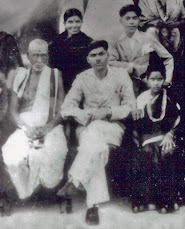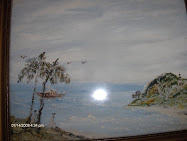When a person says he is writing about a lion, what actually happens is this:
He is actually writing about what he thinks he knows about a lion - not even what he knows, but what he thinks he knows, and that too about that portion of the knowledge that can be put into words.
Both the writer and the reader have an illusion that they are getting to know a lion. The writer thinks that he is showing a lion but what he really does is showing himself talking about a lion. The reader thinks he is seeing a lion, whereas he is simply seeing the author talking about the lion.
The great illusion is not discerning the difference between being talked to about a lion and actually seeing a lion.
Simply because one is engaged in showing himself talking about the lion, and the reader is engaged in seeing the writer showing the lion, both think that they share the honour of knowing a lion, being acquainted with lions, and somehow of one's own self being a little lion.
Thus when the writer is seen, people will say, 'Yes, I know him. There goes the man who knows all about lions.'
The only way to know the lion better is at least walk up to the zoo and stay for a few hours in the vicinity of a lion. Then your eyes behave in a certain way, your heart and lungs in a certain way, your hair and skin in a certain way, your words and thoughts in a certain way, and the complex totality of these reactions becomes your lion. If this total picture is uncomfortable, you go on modifying these reactions till you have a harmonious 'negative', so to say, imprinted in you. It is this process that gives you real learning, and the ease with which a lion tamer approaches a lion is because of this real correspondence between 'his lion' and the lion outside.
This great illusion is the main reason for the flourishing trade in spiritual and religious literature. Probably, one can count on one's fingers the number of persons who have had the Advaita experience of total identity with the universe, but the number of those who expound Advaita, and offer commentaries is legion. This illusion hinders any real attempts to make any conscious effort to acquire the experience. Similarly, the capacity for unconditioned compassion, non-hatred must have been experienced and expressed by a handful in all ages till now, but the expounders and reciters of the appropriate words is enormous.
If the student of self realization has to extricate himself from this misfortune, he must become aware of this dangerous illusion, and avoid like the plague words like, 'I have understood the Gita, except for little bit'; 'I find it very interesting and am even applying it in psychotherapy or business dealings', and so on. One must know that for such audacious nonsense as when a chap who has read a few popular articles on space travel were to pretend to teach it, he would be thrown out on his ears!
The key for self realization profession appears to me to be experiment and experience, and the implementation of teachings resulting even in the smallest change in one's behaviour is worth a ton of dissertations.











